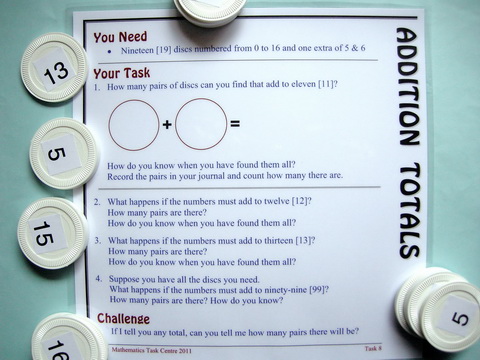
Addition TotalsTask 8 ... Years 4 - 8SummaryGiven a particular whole number, find whole number pairs which sum to that number.
|
Materials
Content
|

IcebergA task is the tip of a learning iceberg. There is always more to a task than is recorded on the card. |
|
Whole Class InvestigationTasks are an invitation for two students to work like a mathematician. Tasks can also be modified to become whole class investigations which model how a mathematician works. |
The whole class lesson for this task is detailed in Maths300 Lesson 18, Addition Totals. To convert the task to a whole class lesson teachers need A4 size pieces of paper with the same numbers as the counters above. Selected students hold these in front of them and demonstrate pairing. Explore 11, then 12, then predict first and check 13. Students may wish to tear up paper to make the equivalent of counters, but most seem happy to use paper and pen once the task is introduced in this physical manner. Maths300 lessons help teachers build whole class investigations to encourage students to work like a mathematician. In this case the essence of the Maths300 lesson plan is presented here so that, if you are not a Maths300 member, you can get a sense of how these lessons are structured. However, no matter how good the lesson, children sometimes add joyful surprises, as this email shows: Hi Doug,For more ideas and discussion about this investigation, open a new browser tab (or page) and visit Maths300 Lesson 18, Addition Totals, which includes an Investigation Guide. |
Is it in Maths With Attitude?Maths With Attitude is a set of hands-on learning kits available from Years 3-10 which structure the use of tasks and whole class investigations into a week by week planner. |
The Addition Totals task is an integral part of:
The Addition Totals lesson is an integral part of:
|